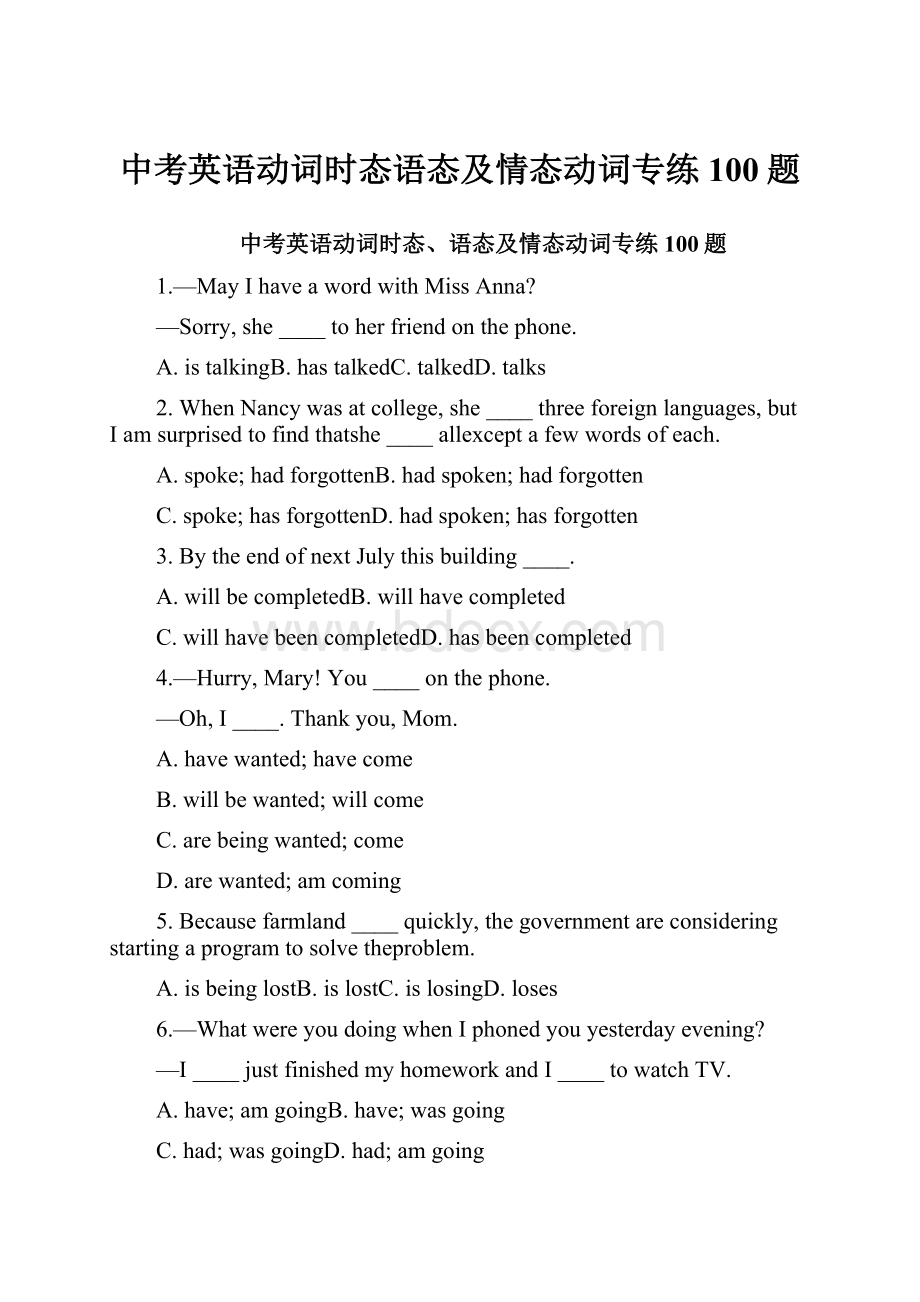中考英语动词时态语态及情态动词专练100题.docx
《中考英语动词时态语态及情态动词专练100题.docx》由会员分享,可在线阅读,更多相关《中考英语动词时态语态及情态动词专练100题.docx(18页珍藏版)》请在冰豆网上搜索。

中考英语动词时态语态及情态动词专练100题
中考英语动词时态、语态及情态动词专练100题
1.—MayIhaveawordwithMissAnna?
—Sorry,she____toherfriendonthephone.
A.istalkingB.hastalkedC.talkedD.talks
2.WhenNancywasatcollege,she____threeforeignlanguages,butIamsurprisedtofindthatshe____allexceptafewwordsofeach.
A.spoke;hadforgottenB.hadspoken;hadforgotten
C.spoke;hasforgottenD.hadspoken;hasforgotten
3.BytheendofnextJulythisbuilding____.
A.willbecompletedB.willhavecompleted
C.willhavebeencompletedD.hasbeencompleted
4.—Hurry,Mary!
You____onthephone.
—Oh,I____.Thankyou,Mom.
A.havewanted;havecome
B.willbewanted;willcome
C.arebeingwanted;come
D.arewanted;amcoming
5.Becausefarmland____quickly,thegovernmentareconsideringstartingaprogramtosolvetheproblem.
A.isbeinglostB.islostC.islosingD.loses
6.—WhatwereyoudoingwhenIphonedyouyesterdayevening?
—I____justfinishedmyhomeworkandI____towatchTV.
A.have;amgoingB.have;wasgoing
C.had;wasgoingD.had;amgoing
7.We____dinneratseveno’clockwhenCCTV____tobroadcastnews.
A.arehaving;willstartB.willbehaving;starts
C.have;willstartD.willhavehad;starts
8.—WhereareJackandMike?
—They____thefurnitureyouaskedforintothehouse.
A.havebeencarryingB.carried
C.havebeencarriedD.werecarried
9.ProfessorHaleytoldmethathe____bymanyofhisstudentsattherailwaystation.A.hadbeenseenoffB.havebeenseenoff
C.hadseenoffD.haveseenoff
10.Aswestoodonthetopofthehill,wecouldseethebeautifulscenethat____beforeus.
A.hadspreadB.hasspreadC.spreadD.spreads
11.Anorderhascomethatthepoliceshouldfindoutwherethethief____.
A.hidesB.washidingC.hidingD.ishidden
12.—Youmustbesurprisedandexcitedtoseethefilmstarhere.
—You’reright.____.
A.Idon’texpecttoseeherhere
B.Ididn’texpecttoseeherhere
C.Iamexpectingtoseeherhere
D.Iexpectedtoseeherhere
13.Mr.Hamfeltthathehimself,ratherthanAliceandLisa,____forthecoldnessthathadgrownbetween
them.
A.weretoblameB.wastobeblamed
C.weretobeblamedD.wastoblame
14.—Whatelsedidyoudothismorningbesidesdoingtheshopping?
—Twohours____washingthewindowsandfloor.
A.weretakenB.wasspent
C.hastakenD.willbespent
15.I’mgladyou’vecome,MissRose;I____you,butyou’vesavedmethetroublenow.A.amgoingtocallB.wasabouttocall
C.hadcalledD.amtocall
16.Didyoutellmethatthere____anEnglishtestthenextweek?
A.wouldbeB.willbeC.isD.were
17.—Didyoumeetthepianistatthestation?
—No,he____bythetimeI____there.
A.hadleft;gotB.hasleft;reached
C.wasleaving;gotD.left;hadgot
18.Ishouldverymuchliketohavegonetothatpartyoftheirs,but____.
A.I’mnotinvitedB.Ihavenotbeeninvited
C.IwasnotinvitedD.Ihadnotbeeninvited
19.—Howistheboy?
—Sorry.He____thoughthedoctormadeeveryefforttosavehim.
A.diedB.wasdeadC.haddiedD.hasbeendead
20.—Bobmustbewealthy.
—Yes,he____moreinonedaythanIdoinaweek.
A.isearningB.earnsC.hadearnedD.hasearned
21.Youcancertainlyleavetheclassroomassoonasyourhomework____.
A.hasdoneB.hasbeendone
C.willbedoneD.willhavebeendone
22.—Didyoutelephonethemanager’soffice?
—Yes,he____backbefore9o’clockthismorning.
A.expectsB.isexpectedC.expectedD.wasexpected
23.—Wouldyouliketotellmewhatourteachersaidjustnow?
—Shesaidthatlight____fasterthansound.
A.travelsB.traveledC.wouldtravelD.wastraveling
24.—HasWilliamfinishedwritinghisgraduationpaperyet?
—Idon’tknowexactly,buthe____allday.
A.iswritingB.hasbeenwriting
C.waswritingD.wrote
25.Whenyoucomeintotheexhibitionhall,youcanseealargeboardwithanoticeonit,sayingvisitors____nottotouchtheexhibits.
A.willrequestB.requestC.arerequestingD.arerequested
26.SARS____inHongKonginthewinterof2002.
A.wasbrokenoutB.wasbrokeout
C.brokeoutD.wasbreakingout
27.—TheChineseastronautYangLiweiisherealready.
—I____he____untiltomorrow.
A.think;iscoming
B.thought;wouldcome
C.didn’tthink;wascoming
D.don’tthink;willcome
28.Thecouple____.Ireallydon’tknowwhy.
A.alwaysquarrel
B.arealwaysquarreling
C.havealwaysquarreled
D.havealwaysbeenquarreled
29.—Mysisterfinishedschoolthreeyearsago.
—What____theseyears?
A.didshedoB.hasshebeendoing
C.isshedoingD.doesshedo
30.—____thesportsmeetingislikelytobeputoff.
—Yes,italldependsontheweather.
A.I’vebeentoldB.I’vetold
C.IwastellingD.Itold
31.Thousandsofpeopletookpartintheworkwhentheoldtemple____.
A.wouldberebuiltB.wasrebuilding
C.wasbeingrebuiltD.hadbeenrebuilt
32.—Wasthetrippleasantwhenyouvacationedinthemountainvillagelastsummer?
—No,it____forfourdayswhenwearrived,sotheroadswereverymuddy.
A.wasrainingB.wouldberaining
C.hadbeenrainingD.haverained
33.Whenandwheretobuildthenewschool____yet.
A.havenotbeendecidedB.arenotdecided
C.hasnotbeendecidedD.hasnotdecided
34.Thisclothyouboughtischeap,butit____well.
A.iswornB.woreC.wearsD.wearing
35.Here____theprofessorandwriteraswellashisfriends.
A.hascomeB.comesC.comeD.arecoming
36.Mymoney____.ImustgotothebanktodrawsomeofmysavingsoutbeforeI’venoneinhand.
A.hasrunoutB.isrunningout
C.hasbeenrunoutD.isbeingrunout
37.Becareful!
Don’tgettheorangejuiceonyourshirt,forit____.
A.isn’twashedoutB.won’tbewashedout
C.won’twashoutD.isn’twashingout
38.Robert____mehisaddresstheotherday,butI’mafraidI____it.
A.hadgiven;lostB.hasgiven;havelost
C.gave;havelostD.gives;havelost
39.Shelly____CaliforniaforTexasin1996and____thereeversince.
A.left;workedB.hasleft;hadworked
C.left;hasworkedD.hasleft;worked
40.—IthoughtIaskedyoutofixtheradio.
—Oh,I’msorry.Mother,I____itrightnow.
A.amtodoB.willdo
C.wasabouttodoD.amgoingtodo
41.Ifshedoesn’ttellhimthetruthnow,he’llsimplykeeponaskingheruntilshe____.A.doesB.hasdoneC.willdoD.woulddo
42.He____totheairporttomeetus,buthehadtoleavebeforewearrived.
A.didgoB.didn’tgoC.wouldgoD.hadgone
43.I____tocomeovertoseeyoulastnight,butsomeonecalledandIcouldn’tgetaway.A.intendedB.hadintended
C.wasintendingD.wasintended
44.—BobhasgonetoNewYork,Ihear.
—Oh,Iwonderwhenhe____.
A.hadleftB.leavesC.leftD.wasleaving
45.—Lookattheblackclouds.It___soon.
—Sure.Ifonlywe____out.
A.israining;didn’tcome
B.istorain;won’tstart
C.willrain;haven’tstarted
D.isgoingtorain;hadn’tcome
46.She____totheofficethanshegotdowntowritingthereport.
A.hasnosoonergotB.hadhardlygot
C.nosoonergotD.hadnosoonergot
47.BeijingChildren’sLibrary____fourbranchlibrariesindifferentdistricts.Theycanreceivemorereadersthanbefore.
A.willsetupB.hasbeensetup
C.hassetupD.setup
48.—Canyouattendtheconferencetomorrow,Bob?
—IthinkIcanwhenmystomachache____completely.
A.willdisappearB.isdisappearing
C.disappearsD.willhavedisappeared
49.Idon’tknowwhatdecision____attheconference,asMikehasn’treportedtomeyet.A.ismadeB.wasmadeC.hasmadeD.hadmade
50.—Doyousmoke?
—No,Idon’t.It’stwoyearssinceI____.
A.smokedB.havesmoked
C.hassmokedD.don’tsmoke
答案及解析:
1.A。
根据sorry一词可以判断出Anna小姐正在给她朋友打电话,故用现在进行时。
2.C。
Nancy上大学时讲三门外语,用一般过去时符合题意;从butIamsurprisedtofind...来看,应该是叙述她目前对这三门外语的掌握情况,故用现在完成时。
3.C。
“bytheendof+表将来的时间”通常和将来完成时连用。
complete用作及物动词,此处要用被动语态。
4.D。
Youarewantedonthephone.为固定表达;“Iamcoming.”意思是“(我)来啦!
”,符合上下文语意。
5.A。
从主句的时态可以判断出,要解决的问题是目前存在的问题;从quickly一词可以看出用进行时态合适,故选A。
6.C。
问句是问过去发生的事,因此,答语中要用过去时态才符合逻辑。
7.B。
“willbedoingsth.”为将来进行时,口语中常用此时态表示将来某时正发生的事。
该题从句中用一般现在时表示一段时间或很长时间内不变的计划或安排。
8.A。
“杰克和迈克一直在往屋里搬运‘你’要的家具。
”这句话正是英语中现在完成进行时常表达的含义。
9.A。
学生为Haley教授送行的事实发生在他告诉我之前,故而要用过去完成时。
10.C。
此处的spread为过去式,作不及物动词用。
11.D。
“behidden”表示躲藏的状态;选项B时态错误。
12.B。
“Ididn’texpectto...”表示“我原没有料到……”,符合题意。
13.D。
从句中的主语是he,因此A、C不正确;“betoblame”是固定结构,意为“应该受到责备”。
14.B。
问句问的是过去发生的事,答语也应用过去时;“spendtime(in)doingsth.(花费时间做某事)”是固定结构。
15.B。
从“butyou’vesavedmethetroublenow”可以判断出“我”没有给“你”打电话,因此“wasabouttocall(刚要打电话)”符合题意。
16.A。
主从句的时态通常应保持一致。
这儿用过去将来时态符合题意。
17.A。
“bythetime”通常和过去完成时或将来完成时连用,其引导的从句通常使用一般过去时或一般现在时。
根据问句,应选A。
18.C。
“我”本来非常想参加他们的晚会,可是没人邀请。
谈的是过去发生的事,用一般过去时符合题意。
19.A。
强调“死”这个动作?
熏用die;强调“死”的状态?
熏用bedead。
根据从句中的时态来看,选A合适。
20.B。
21.B。
在时间状语从句中可以用现在完成时表示将来,强调从句的动作发生在主句谓语所表示动作之前。
22.B。
“heisexpected...”意为“人们预计他……”。
23.A。
表示客观真理常用一般现在时。
24.B。
表示“一整天都在做某事(此时该动作还没有结束)”要用现在完成进行时。
25.D。
“requestsb.(not)todosth.要求某人(不要)做某事”是固定结构,根据题干,应使用被动语态。
26.C。
breakout(爆发)没有被动语态。
27.C。
在此之前,“我”认为“杨利伟”明天才能到这儿,此题应注意否定转移和not...until...句型。
28.B。
always同进行时态连用通常表示说话者赞扬、责备、厌恶等情绪。
29.B。
“这些年她都在做什么?
”要用现在完成进行时来表示。
30.A。
根据宾语从句中的时态可以判断出正确答案,选项B的错误在于told后缺间接宾语。
31.C。
用过去进行时的被动语态表示动作的持续。
32.C。
根据题意及“forfourdays”,应采用过去完成进行时。
33.C。
whenandwheretobuildthenewschool指的是“一件事”,故谓语动词用单数形式,且decide一词用作及物动词,所以应用被动语态。
34.B。
wearwell意为“耐用”。
某些可以用来表达事物内在品质或属性的动词(如:
draw,read,sell,wash,write,open,shut),常用主动形式表示被动含义。
35.B。
36.B。
由后文看出,钱还未用完,故用现在进行时表将来。
37.C。
解析见34。
38.C。
39.C。
由于有明确的过去时间(in1996),故第一空应用left;eversince常与完成时态连用。
40.B。
此处用willdo表示临时决定要做的事。
41.A。
主句用一般将来时,until/when/before/unless/if等引导的从句常用一般现在时表将来。
42.A。
助动词does/do/did+动词原形,起加强语气的作用。
43.B。
hadintended/thought/planned/wanted/expected/hopedtodosth.等常用来表示主语未曾达到的希望、愿望或打算。
44.C。
45.D。
begoingtodosth.常见的用法为:
①表示按计划或安排打算去做某事,②表示有迹象表明要发生某事,此题是第二个用法。
ifonly引起的句子中